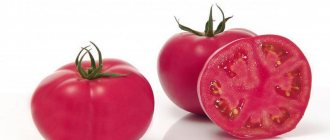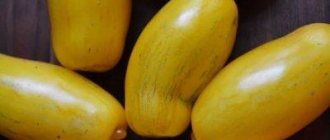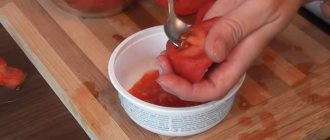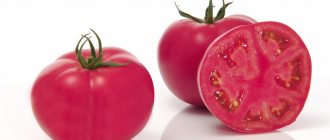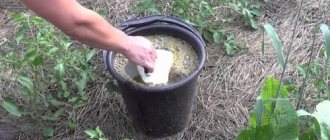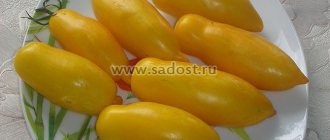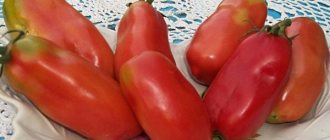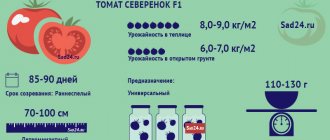Tomato Pink Clear F1 is a wonderful pink-fruited hybrid with heavy fruits that have a pleasant taste. It can be used in a number of culinary recipes and is made easy to grow due to its excellent disease resistance.
| Height | Landing location | Ripening time | Fruit color | Fruit size | Origin | Fruit shape |
| Tall | Greenhouse | Mid-season | Pink | Large | Hybrid | Flat-round |
Pink Claire: description of the variety
| Variety name | Pink Claire |
| general description | Early maturing, high-yielding hybrid of the first generation |
| Originator | Israel |
| Ripening period | 95-100 days |
| Form | The fruits are round-flat with slightly noticeable ribbing |
| Color | Warm pink |
| Average weight of tomatoes | 170-300 grams |
| Application | Universal |
| Productivity of the variety | up to 25 kg per square meter |
| Features of cultivation | Standard agricultural technology |
| Disease resistance | Resistant to major diseases, but prevention is a good idea |
First generation hybrid, early ripening, high-yielding. From the appearance of sprouts to the ripening of fruits, 95-100 days pass .
The bush is indeterminate, powerful and spreading, with a well-developed root system. Requires timely stepsoning. The green mass is abundant, the fruits ripen in clusters of 4-6 pieces.
Tomato variety “Pink Claire” F1, description: medium-sized fruits, round-flat, with subtle ribbing, dense shiny skin. Ripe tomatoes do not crack. The weight of a ripe tomato is 170-300g . The color is rich warm pink, monochromatic. The pulp is low-seeded, very juicy, moderately dense, sugary when broken. The taste is rich, sweet, with barely noticeable sourness.
You can compare the weights of different varieties in the table below:
| Variety name | Fruit weight |
| Pink Claire | 170-300 grams |
| Nastenka | 150-200 grams |
| Valentina | 80-90 grams |
| Garden pearl | 15-20 grams |
| Domes of Siberia | 200-250 grams |
| Caspar | 80-120 grams |
| Morozko | 50-200 grams |
| Blagovest f1 | 110-150 grams |
| Irina | 120 grams |
| Octopus f1 | 150 grams |
| Dubrava | 60-105 grams |
Description and characteristics of the variety
The culture was created by Israeli breeders. The application is universal: the smallest fruits can be canned, the rest can be eaten fresh, prepared juices, sauces, added to soups, stews and slices. The hybrid is planted in all regions of the Russian Federation and neighboring countries, but in the middle zone and in the north it needs greenhouse shelters, and in the south open ground is acceptable.
The hybrid Pink Clear F1 has an indeterminate type of bush, the stems reach more than 2 meters in height. The bush is powerful, medium leafy. The leaves are dark green, medium. Tomatoes are collected in brushes containing 5-6 pieces. In terms of timing, it is mid-season - 90-105 days pass after germination before harvesting.
The fruits are pink, flat-round, the average weight of each is 100-300 g. There is light ribbing. There are few seeds inside. The pulp is sugary, not too dense, juicy, slightly sour, but generally sweet.
Tomatoes contain a lot of vitamin PP, that is, nicotinic acid, which helps eliminate toxins, and also contains B vitamins, which help the gastrointestinal tract and improve the functioning of all cells in the body.
Origin and application
The Pink Claire tomato variety was bred by Israeli breeders. Warm regions allow it to be grown in open beds; in areas with a cool climate, glass greenhouses and film greenhouses should be preferred.
Advantages and disadvantages
Among the main advantages of the variety:
- excellent taste of the fruit;
- high productivity;
- resistance to adverse weather conditions: drought, heat, temperature changes;
- immunity to the main diseases of tomatoes in greenhouses.
Among the shortcomings are::
- the need to form a bush;
- sensitivity to soil nutrition.
You can compare the yield of the variety in the table below:
| Variety name | Productivity |
| Pink Claire | up to 25 kg per square meter |
| Lazy | 15 kg per square meter |
| Rocket | 6.5 kg per square meter |
| Summer resident | 4 kg per bush |
| Premier | 6-9 kg per square meter |
| Doll | 8-9 kg per square meter |
| Stolypin | 8-9 kg per square meter |
| Broody | 10-11 kg per square meter |
| Black bunch | 6 kg per bush |
| Fat Jack | 5-6 kg per bush |
| Brawler | 9 kg per bush |
Features of cultivation
Pink Claire tomatoes are propagated by seedlings. Seeds are sown in the first half of March; for ground cultivation, they can be sown later, closer to April.
Disinfection of seed material is not required; all necessary manipulations are carried out before sale. You can fill them with a growth stimulator for 10-12 hours, this significantly increases germination.
The soil for seedlings is chosen to be light and neutral in acidity . It is recommended to mix garden soil with humus or peat. For greater nutritional value, superphosphate or wood ash is added.
Sowing is carried out at a depth of up to 2 cm. For germination, stable heat is required (23°C-25°C). After the sprouts appear, the containers are exposed to the sun or under fluorescent lamps. Watering is moderate, only soft, settled water is used . When the sprouts develop their first true leaves, the tomatoes are pruned and fed with a complete complex fertilizer.
One more feeding is needed before planting in the ground. If the sprouts are thin and sluggish, it is recommended to feed them with urea or another nitrogen-containing preparation. You can move the seedlings to the beds in the second half of May.
The soil is spilled with hot water, the bushes are placed at intervals of at least 60 cm. The distance between rows is 70 cm . Thickening of plantings is unacceptable, as this greatly reduces fruiting. The bushes are tied to supports and formed into 1-2 stems, removing the stepsons and lower leaves. During the season, tomatoes need to be fed 3-4 times with complete complex fertilizer.
Growing: tips
- Tomato sowing should be done in late February or early March. It is of great importance to prepare good soil, both for seedlings and in open ground.
- Before sowing, the seeds are disinfected in a solution of potassium permanganate for 10-15 minutes. In turn, they can be soaked in a growth stimulator for better fruiting. Soil for seedlings is bought in specialized departments for gardeners or prepared from females. To do this, mix peat, humus and a little ash. Pallets or boxes can be drained. Before placing the seeds in the ground, the holes or furrows are shed with a small amount of water. The seeds are buried at a distance of 1–1.5 cm and placed 2–3 cm apart. Afterwards they are covered with earth. For better germination, the containers are covered with film and placed in a lighted room.
- Picking tomatoes is carried out next to the appearance of 2 - 3 leaves. Each sprout is placed in a separate container, with the intention of not damaging the root system when planting the tomato in the ground.
- In order to transfer seedlings, it is important to prepare good soil and add fertilizers: potash, phosphorus, nitrogen, manure and ash. Plants are planted at a distance of 60 cm from each other.
It is necessary to change the soil with almost crops as often as possible. It is better to plant tomatoes in the soil where carrots, mess, dill and legumes grew. Do not use soil from zucchini, peppers and potatoes.
